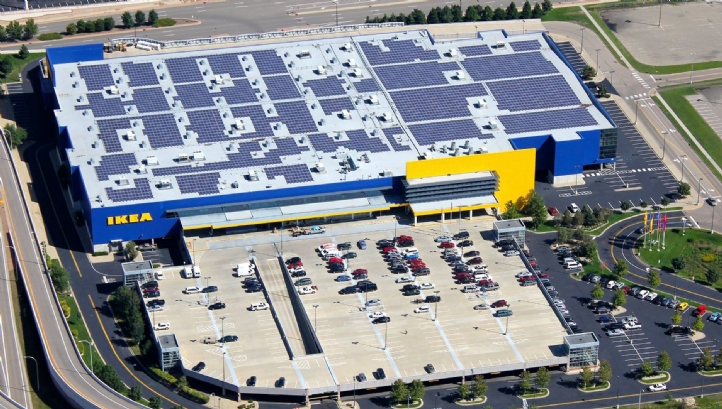The world’s largest furniture retailer has revealed that 70% of the materials used to make its products during 2018 were either renewable or recycled, as it strives to reach the 100% mark by 2030.

Ikea’s ‘People and Planet Positive’ strategy includes a 2020 target of producing more renewable power than it uses
The progress was posted in Ikea’s latest sustainability report, which also documents the actions the retail giant has taken to date to achieve its visions of becoming “climate-positive”, free from single-use plastic and sourcing 100% renewable energy. These overarching aims were set last June as part of Ikea’s refreshed ‘People and Planet Positive’ sustainability strategy.
Published late last week, the sustainability report reveals that 60% of all the raw materials Ikea sourced to produce products during 2018 were from “renewable” sources such as cotton and bamboo, with a further 10% accounted for by pre or post-consumer recycled material. It claims that Ikea is “on track” to achieve 100% by 2030 but will need to work with industry to spur the creation of larger supply chains for recycled materials such as wood, plastic and fabrics.
The 59-page report additionally notes that 100% of the cotton sourced by Ikea during 2018 was certified as sustainable for a second year running, while the proportion stood at 85% for wood – up from 77% in 2017.
With regards to renewable power, the report reveals that Ikea now uses renewable generation to meet 86.7% of the heating and 81.1% of the electricity needs across its manufacturing supply chain. Key renewable arrays installed during 2018 include an 18,240-panel rooftop solar solution on Ikea’s Industry production unit in Portugal and an innovative solar cooling system at its Alexandra store in Singapore. The system converts thermal heat into chilled water for air conditioning in the store and has reduced the site’s energy consumption by almost one-quarter (24%) to date.
“We always think long term, innovating to ensure that our actions to meet people’s needs today do not compromise the ability of future generations to meet their needs,” the Inter Ikea Group’s head of sustainability Lena Pripp-Kovac wrote in the report foreword.
“This requires us to rethink and inspire changes in lifestyles and consumption and to transform our way of working – from linear to circular, from consuming to regenerating resources.”
Climate positive challenges
The progress update comes as Ikea is striving to become “climate-positive” by 2030 – an aim the firm has defined as fulfilling its contribution to the Paris Agreement through an emissions reduction across the value chain that is aligned to climate science.
The multinational is targeting an 80% climate footprint reduction from stores and operations in absolute terms by 2030 – against a 2016 baseline – which aligns to a 2C target and aims towards the 1.5C trajectory towards the end of the century. Ikea claims that reducing emissions by 15% from the value chain by 2030 translates to a 70% reduction in climate footprint on average per product, and is therefore working to decarbonise key materials, food ingredients and transport, while setting more ambitious reduction targets for direct suppliers.
According to the new sustainability report, the climate footprint of Ikea’s value chain during 2018 was 2.8% higher than in 2016, largely due to the expansion of the business. It lists the key contributors to the business’s overall climate footprint as raw materials (36.4%), product use at home (22.2%) and customer travel and home deliveries (15.5%).
“Decoupling our growth from greenhouse gas (GHG) emissions will take time, and we expect our emissions to increase for a few years before decreasing,” the report states.
“Becoming climate positive will be a huge challenge for Ikea. We will only achieve it by joining together with others and listening to feedback from our stakeholders on how to improve.”
Living Lagom
The report also lists a number of other key sustainability challenges which lay between Ikea and the achievement of its sustainability goals, including the improvement of working conditions throughout its supply chains, the need to bolster value chain reporting and the urgency of inspiring new sustainable consumption models among the general public.
The latter of these challenges has long been addressed by Ikea’s “Live Lagom” campaign, which urges consumers to adopt its Swedish cultural vision of creating a home in which they create a harmonious lifestyle by not wasting resources or energy. The scheme has included the launch of dozens of innovative products designed to make home living more sustainable, including meatless meatballs, a kitchen made using 100% post-consumer recycled (PCR) plastics and PCR wood and energy-efficient lighting.
New products unveiled within this range last year include air-purifying curtains, a water-saving mister nozzle and vegetarian hotdogs, while Ikea is also in the process of transforming its offerings and store models to encourage more sustainable consumption and travel habits. The firm’s new Greenwich store, for example, includes an interactive upcycling hub and lab, a network of electric vehicle (EV) chargers and real-time displays of public transport information. It additionally offers customers the chance to have their items delivered by e-bike or electric van and to send their end-of-life products for recycling when they receive a delivery of new goods.
Turning Ambition into Action at edie Live 2019
In a similarly honest fashion to Ikea, a number of big businesses including Landsec, Sky and Waitrose will appear at edie Live (21-22 May 2019) to discuss the challenges and opportunities to achieving a sustainable future.
The two-day show – edie’s biggest event of the year – has become a highlight of the calendar for sustainability, energy and environment professionals looking for new ideas and solutions that will help them achieve a low-carbon, resource efficient and profitable future for their business.
Register for your free edie Live 2019 pass here.
Sarah George
